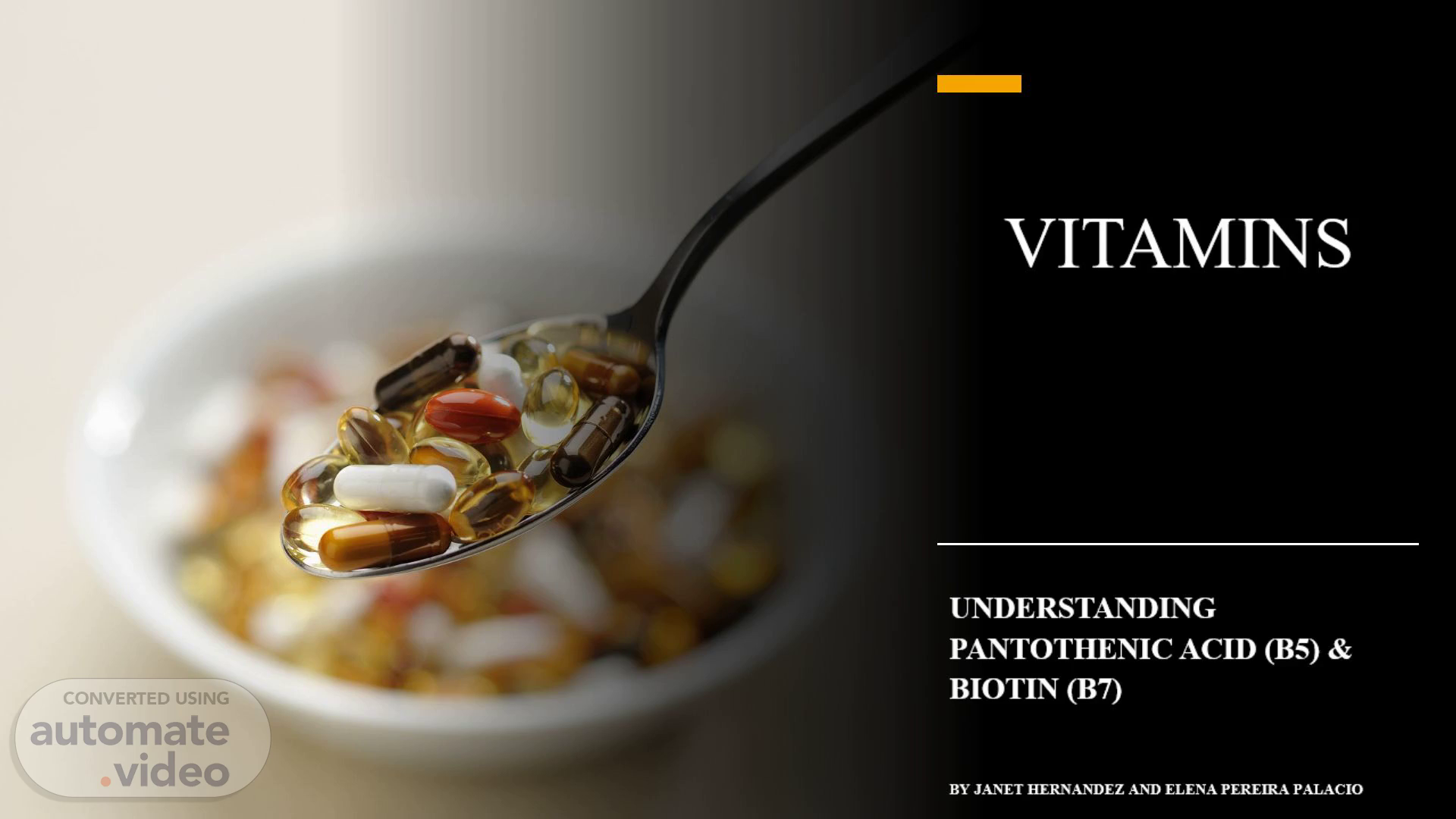Scene 1 (0s)
[Audio] Hello everyone! Today, we'll be talking about two essential vitamins: Vitamin B5, also known as Pantothenic Acid, and Vitamin B7, commonly referred to as Biotin. Both of these vitamins play key roles in maintaining our overall health, especially in energy metabolism..
Scene 2 (21s)
[Audio] Vitamin B5 plays a critical role in the body, particularly in energy metabolism. It's a key component of coenzyme A, which is essential for the synthesis and breakdown of fatty acids. Additionally, Vitamin B5 is involved in the production of hormones, especially stress-related hormones from the adrenal glands..
Scene 3 (1m 19s)
[Audio] Though rare, Vitamin B5 deficiency can lead to a condition known as 'burning feet syndrome,' where individuals experience numbness, burning, or tingling in their feet. Other symptoms include fatigue, irritability, and difficulty sleeping. Since this vitamin is found in many foods, deficiency is typically uncommon in the general population..
Scene 4 (1m 57s)
[Audio] Currently, no major toxicity symptoms have been associated with Vitamin B5, even at high intakes. The body is generally able to excrete excess amounts through urine. However, very high doses may cause minor gastrointestinal issues, like diarrhea..
Scene 5 (2m 16s)
[Audio] Some excellent sources of Vitamin B5 include meats like chicken and beef, whole grains, avocados, broccoli, and mushrooms. It's also present in dairy products, eggs, and legumes, making it accessible in a variety of diets..
Scene 6 (2m 37s)
[Audio] As healthcare providers, it's important to recognize that most people will get sufficient Vitamin B5 through a balanced diet. However, in cases of malnutrition, or in people with conditions that impair nutrient absorption, supplementation might be necessary. Nurses should assess diet and lifestyle to ensure sufficient intake. Patients recovering from surgery or those with chronic stress may benefit from additional B5 to support hormone production and wound healing..
Scene 7 (3m 16s)
[Audio] In popular culture, Vitamin B5 is often touted for its skin and hair benefits, particularly in treating acne. While B5's role in skin health is not a myth, the claims are sometimes overstated. There is some evidence that it can help reduce acne, but it's not a miracle cure..
Scene 8 (3m 44s)
REFERENCES. NIH. (2021, March 26). Pantothenic Acid. Retrieved from National Institutes of Health: https://ods.od.nih.gov/factsheets/PantothenicAcid-HealthProfessional/ Sanvictores, T., & Chauhan, S. (2024, February 29). Vitamin B5 (Pantothenic Acid). Retrieved from National Library of Medicine: https://www.ncbi.nlm.nih.gov/books/NBK563233/.
Scene 9 (4m 6s)
[Audio] Moving on to Vitamin B7, or Biotin, this nutrient is vital for metabolizing fats, carbohydrates, and proteins. It's also crucial for maintaining healthy hair, skin, and nails. Biotin is often marketed as a beauty supplement for hair growth and nail strength..
Scene 10 (4m 30s)
[Audio] Vitamin B7 deficiency is rare, but it can occur in individuals with poor nutrient absorption or those who consume raw egg whites over long periods—since a protein in raw eggs, avidin, binds to Biotin and prevents its absorption. Symptoms include thinning hair, brittle nails, skin rashes, and neurological issues such as depression or lethargy..
Scene 11 (4m 55s)
[Audio] Similar to Vitamin B5, Biotin does not have any known toxicity at high levels, and it's considered safe. High doses are excreted in urine, and no adverse effects have been reported from taking large amounts of Biotin..
Scene 12 (5m 14s)
[Audio] Biotin-rich foods include eggs (cooked), nuts, seeds, salmon, sweet potatoes, and spinach. Whole grains and dairy products also provide a good amount of Biotin. Like B5, Biotin is widely available in a typical balanced diet..
Scene 13 (5m 34s)
[Audio] Healthcare providers should be aware that some patients may be at risk for Biotin deficiency, especially those with conditions like Crohn's disease or individuals on long-term anticonvulsant medications. Pregnant women may also need higher amounts. Nurses should educate patients on the importance of incorporating Biotin-rich foods in their diet or taking supplements, especially if they experience symptoms like hair loss or brittle nails..
Scene 14 (6m 21s)
[Audio] In popular culture, Biotin is often hailed as a miracle nutrient for hair growth. While it does play a role in maintaining healthy hair, skin, and nails, the hype around it can sometimes exaggerate its effectiveness. Most people who are not deficient won't experience significant changes from Biotin supplements. The claims are based on fact, but they are sometimes inflated for marketing purposes..
Scene 15 (6m 49s)
[Audio] In conclusion, both Vitamin B5 and B7 play important roles in maintaining our health, from energy metabolism to skin, hair, and nail health. While deficiencies are rare, healthcare providers should be aware of potential risks in specific populations and educate patients accordingly. And when it comes to popular culture, it's important to separate fact from myth, especially with the marketing of supplements." Thank you for your attention! I'd now like to open the floor for 2 questions..
Scene 16 (7m 23s)
Question #1. Colourful pills stacked to make a bar graph.
Scene 17 (7m 38s)
Question #2. Which food is considered an excellent source of vitamin B5 (pantothenic acid)? A) Chicken B) Apples C) White rice D) Potatoes.
